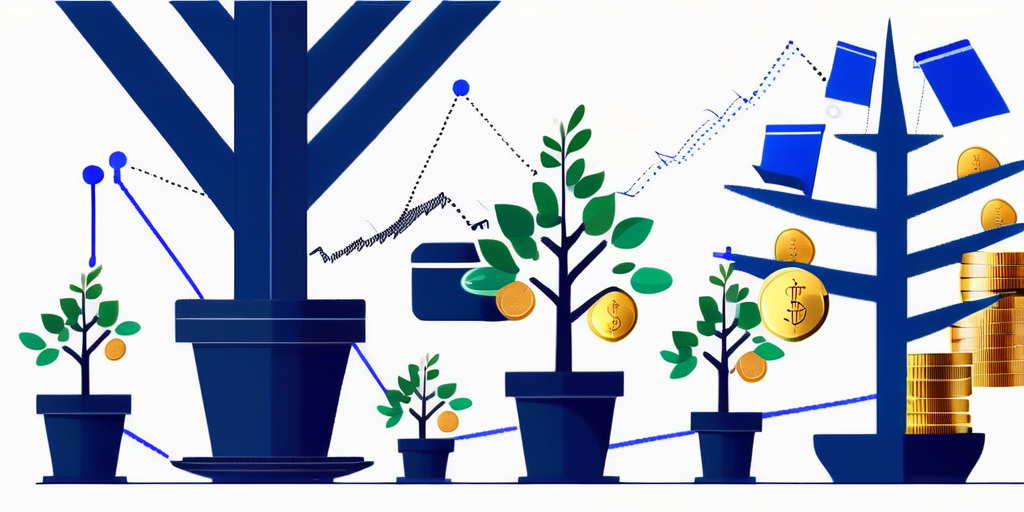In today's fast-paced and unpredictable world, saving money and growing your wealth has become more important than ever. Whether you're just starting your financial journey or looking to enhance your current savings strategy, these ten money tips will help you achieve your goals. Understanding the basics of saving, implementing effective strategies, investing wisely, and planning for retirement are all essential steps on the path to financial success. So, let's dive in and explore these money-saving tips in detail.
Understanding the Basics of Saving
It is crucial to understand the importance of saving money before diving into any saving or investment strategy. Saving money offers a plethora of benefits, including financial security, emergency preparedness, and the ability to achieve long-term goals. By saving diligently and consistently, you can lay a strong foundation for your financial future.
1 The Importance of Saving
Saving money is not just about having a stash of cash. It's about securing your financial well-being. By saving, you create a safety net for unforeseen events, such as job loss or medical emergencies. Additionally, saving allows you to take advantage of opportunities when they arise, such as investing in a business or purchasing a home.
Imagine this scenario: You've been working hard for years and have built up a substantial amount of savings. Suddenly, you find yourself facing unexpected unemployment. Thanks to your diligent saving habits, you have a financial cushion that allows you to cover your expenses while you search for a new job. Without those savings, you would have been in a much more precarious situation, struggling to make ends meet.
Furthermore, saving money gives you the freedom to pursue your dreams and aspirations. Whether it's starting your own business, traveling the world, or retiring early, having a solid financial foundation can make all the difference. By saving consistently, you are investing in your own future and creating opportunities for yourself.
2 Setting Financial Goals
Before you can start saving effectively, it's essential to set clear financial goals. These goals will serve as your roadmap and keep you motivated along the way. Whether your goals are short-term, like saving for a vacation, or long-term, like buying a house or retiring comfortably, having a clear plan in place will help you stay focused and committed.
Let's say you dream of owning a beautiful beach house. By setting a specific savings goal and creating a timeline, you can break down the amount you need to save each month. This approach not only makes the goal more manageable but also keeps you accountable. As you see your savings grow, you'll feel a sense of accomplishment and be motivated to keep going.
Moreover, setting financial goals allows you to prioritize your spending and make conscious decisions about where your money goes. It helps you distinguish between needs and wants, ensuring that you allocate your resources wisely. By aligning your spending with your goals, you'll be able to make progress towards achieving them.
3 Creating a Budget
One of the most effective ways to start saving is by creating a budget. A budget allows you to track your income and expenses, helping you identify areas where you can cut back and save more. Start by listing all your sources of income and then track your monthly expenses. Analyze your spending habits and identify areas where you can make adjustments. By sticking to a budget, you'll be amazed at how much money you can save.
Let's dive deeper into the process of creating a budget. Begin by categorizing your expenses into different groups, such as housing, transportation, food, entertainment, and savings. This will give you a clear picture of where your money is going and help you identify any areas of overspending.
For example, you might realize that you're spending a significant portion of your income on dining out. By making a conscious effort to cook more meals at home and reduce eating out, you can save a substantial amount of money each month. Small changes like this can add up over time and make a significant impact on your savings.
Additionally, a budget allows you to plan for future expenses and avoid unnecessary debt. By setting aside money for upcoming events, such as birthdays or holidays, you can avoid relying on credit cards and stay within your means. This proactive approach to managing your finances will not only save you money in interest payments but also reduce financial stress.
In conclusion, understanding the basics of saving is essential for financial well-being. By recognizing the importance of saving, setting clear financial goals, and creating a budget, you can take control of your finances and build a secure future. Remember, saving is not just about accumulating money; it's about creating opportunities and achieving your dreams.
Strategies for Effective Saving
Now that you understand the basics of saving, let's explore some effective strategies to help you save even more.
Saving money is not just about putting away a portion of your income each month. It requires a thoughtful approach and a commitment to making smart financial decisions. By implementing the following strategies, you can maximize your savings and achieve your financial goals.
4 Automating Your Savings
One of the easiest and most effective ways to save money is by automating your savings. Set up an automatic transfer from your checking account to a savings account each month. By doing this, you'll be paying yourself first and ensuring that saving becomes a priority.
Imagine waking up on payday and knowing that a portion of your income has already been allocated towards savings. This not only eliminates the need for manual transfers but also removes the temptation to spend the money before saving it. Over time, your savings will grow steadily, providing you with a financial safety net and the ability to pursue your long-term goals.
5 Cutting Down on Unnecessary Expenses
We all have expenses that we can live without. Take a closer look at your monthly expenses and identify areas where you can cut back. This might include eating out less frequently, reducing entertainment expenses, or renegotiating your utility bills.
Consider the daily coffee you buy on your way to work. By making your coffee at home, you could save hundreds of dollars each year. Similarly, instead of going out for dinner every weekend, try cooking a delicious meal at home with friends or family. Not only will you save money, but you'll also enjoy the satisfaction of creating something special.
Remember, cutting down on unnecessary expenses doesn't mean sacrificing your quality of life. It simply means being more mindful of where your money goes and finding creative ways to enjoy life without breaking the bank.
6 Saving on Utilities and Bills
Another excellent way to save money is by reducing your utility and bill expenses. Consider making small changes that can have a big impact on your monthly bills.
Start by installing energy-efficient light bulbs throughout your home. These bulbs use less electricity and last longer, saving you money on your energy bill. Additionally, insulating your home can help regulate the temperature and reduce the need for excessive heating or cooling.
Another simple adjustment is to adjust your thermostat settings. Lowering the temperature in the winter and raising it in the summer by just a few degrees can result in significant savings over time. You can also take advantage of natural light during the day to reduce the need for artificial lighting.
By implementing these small changes, you'll not only save money but also contribute to a more sustainable future. It's a win-win situation for both your wallet and the environment.
Remember, effective saving requires discipline and consistency. By automating your savings, cutting down on unnecessary expenses, and finding ways to save on utilities and bills, you'll be well on your way to achieving your financial goals. Start implementing these strategies today and watch your savings grow!
Investing to Grow Your Wealth
In addition to saving money, investing is a powerful way to grow your wealth. This section will explore some key aspects of investing that you should consider.

Introduction to Investing
Investing is the process of putting your money to work for you. It involves purchasing assets such as stocks, bonds, real estate, or mutual funds with the expectation of generating a return. Before you dive into the world of investing, it's crucial to educate yourself about the different investment options available and their associated risks and rewards.
7 Diversifying Your Investments
Diversification is an essential principle of investing. By diversifying your investments, you spread your risk across different asset classes and reduce the impact of any single investment's performance on your overall portfolio. Consider investing in a mix of stocks, bonds, Real Estate Investment Trusts (REITs), and other assets to diversify your investment portfolio.
8 Risk Management in Investing
Investing always involves some level of risk. Understanding and managing this risk is crucial to protecting your wealth. Different investments carry different levels of risk, so it's important to assess your risk tolerance and align your investment strategy accordingly. Consider consulting with a financial advisor to help you navigate the complexities of risk management in investing.
Retirement Planning
Lastly, it's essential to plan for your retirement. The sooner you start preparing for retirement, the better off you'll be. Let's explore some important aspects of retirement planning.

Understanding Retirement Plans
Retirement plans such as 401(k)s, IRAs, and pension plans are designed to help individuals save for retirement. It's essential to understand the different retirement plans available to you and take advantage of employer match programs if offered. By contributing to your retirement plan consistently, you can build a nest egg that will provide financial security during your retirement years.
9 The Role of Compound Interest
Compound interest is a powerful tool in growing your retirement savings. By earning interest on both your initial investment and the accumulated interest over time, your savings can grow exponentially. Start saving for retirement early to maximize the benefits of compound interest.
10 Early Retirement Planning
If early retirement is a goal of yours, it's essential to start planning and saving as early as possible. Consider exploring retirement strategies such as the FIRE (Financial Independence, Retire Early) movement or consulting with a financial planner who can help you create a customized early retirement plan.
In conclusion, these ten money tips provide a comprehensive guide to help you save and grow your wealth. By understanding the basics of saving, implementing effective strategies, investing wisely, and planning for retirement, you can achieve your financial goals and secure a brighter future. Remember, it's never too late to start improving your financial situation. So take action today and embark on your journey towards financial success!
Ready to take your financial future into your own hands? Join Tiblio today and be part of the revolution in the capital markets. Our commitment to transforming how individual investors engage with financial markets aligns perfectly with your journey to save and grow your wealth. With Tiblio, you'll gain direct, algorithmic control over your investments, leveraging state-of-the-art technology that integrates with your existing brokerage account seamlessly.
Don't just connect with the financial world—lead the change and empower your investment strategy. Join now and start shaping your path to financial independence.
